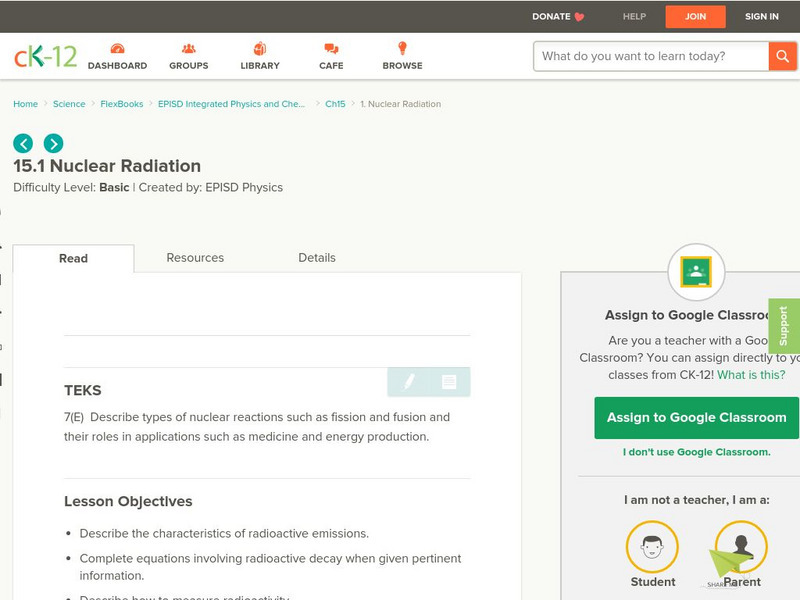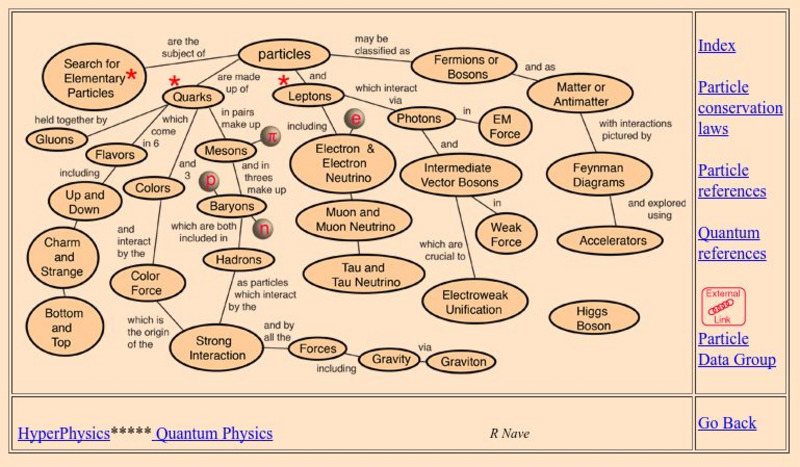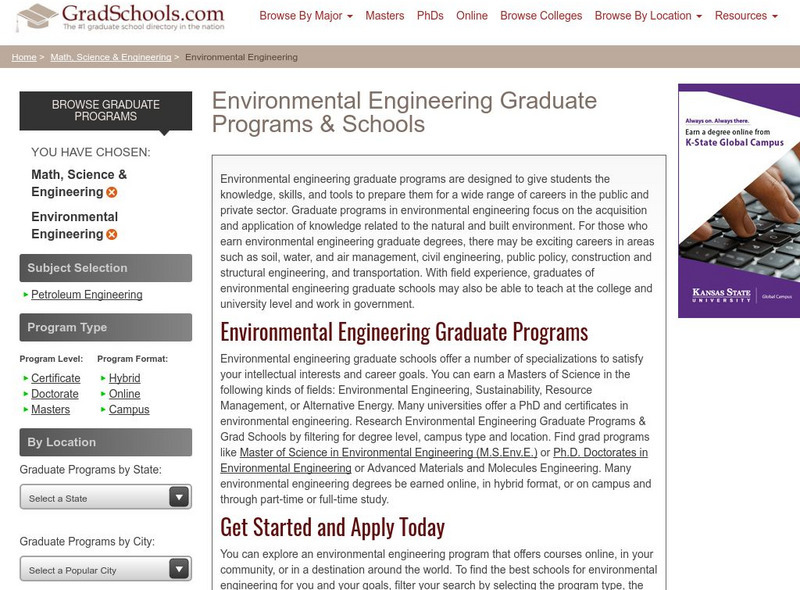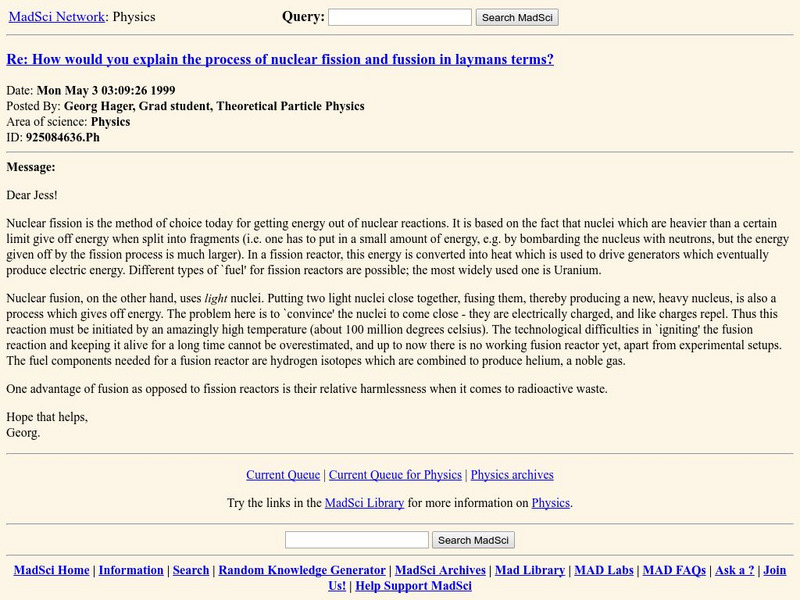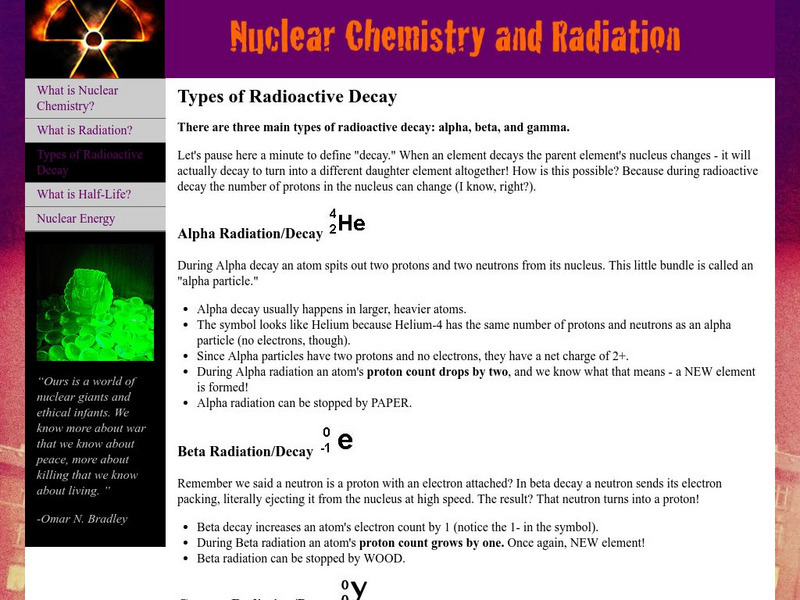Encyclopedia of Earth
Encyclopedia of Earth: Thorium
Information about the element, Thorium, atomic number 90. Covers physical properties, atomic properties, how abundant it is on the Earth, where it is found, and details about health-related regulations. Discusses thorium's potential use...
Encyclopedia of Earth
Encyclopedia of Earth: Plutonium
Information about the element, Plutonium, atomic number 94. Covers physical properties, atomic properties, how abundant it is on the Earth, and details about health-related regulations. Discusses reactor- and weapons-grade plutonium, and...
Encyclopedia of Earth
Encyclopedia of Earth: Uranium
Information about the radioactive element, Uranium, atomic number 92. Describes its history, physical and atomic properties, how abundant it is on the Earth, and permissible exposure limits. Also discusses sources, uses, isotopes,...
CK-12 Foundation
Ck 12: Nuclear Radiation
[Free Registration/Login may be required to access all resource tools.] Students investigate the characteristics of radioactive emissions, and then complete equations involving radioactive decay when given pertinent information.
CK-12 Foundation
Ck 12: Fourth Grade Science: Physical Science: Forms and Changes of Energy
[Free Registration/Login may be required to access all resource tools.] Discusses different forms of energy and how energy changes form.
CK-12 Foundation
Ck 12: Radioactivity
[Free Registration/Login may be required to access all resource tools.] This lesson explains the types of radioactive decay and how to write nuclear equations. Includes simulations for learning about alpha and beta particle decay.
Other
American Institute of Physics: Soviet Physics, Nuclear Weapons, and Human Rights
A resource with extensive information on all aspects of Sakharov's life. Arranged chronologically.
Georgia State University
Georgia State University: Hyper Physics: Particles
This is a very detailed site containing information on several sub-atomic particles including the Hadron.
MadSci Network
Msn: What Regulates the Speed of Hydrogen Fusion?
From the Mad Scientist Network web site. Using a question and answer format, this page describes the various types of fusion processes and the physical requirements needed for their initiation and sustenance. Factors affecting the rates...
Other
Environmental Engineering: Graduate School Directories
This is a website with links to schools offering graduate programs in Nuclear Engineering.
MadSci Network
Msn: How Would You Explain the Process?
From the Mad Scientist Network web site. Using a question and answer format, this page explains the differences between nuclear fusion and nuclear fission. The details of each process are sketched in simple language.
Science Struck
Science Struck: 8 Albert Einstein Inventions That Impacted the World
Describes the refrigerator invented by Einstein and many of his discoveries in physics.
Learn AP Physics
Learn Ap Physics: Physics B: Modern Physics
A site dedicated to help students prepare for the AP Physics B test. This specific site reviews Modern Physics including photons, photoelectric effect, atomic energy levels, The Michelson-Morley experiment, The Lorentz Transformation,...
Lawrence Berkeley National Laboratory
Berkeley Lab: Nobel Prizes in Nuclear Science
Provides a list of Nobel Prize winners in the field of nuclear science that includes the discoveries of spontaneous radioactivity, radium, and the neutron.
Lawrence Berkeley National Laboratory
Berkeley Lab: Misconceptions About Nuclear Science
This site sets the record straight on some common misconceptions about Nuclear Science.
Other
Dundee Medical Physics: Nuclear Medicine
Brief explanation of the field of nuclear medicine, followed with the various procedures and capabilities at Dundee.
ClassFlow
Class Flow: Soviet Nuclear Legacy
[Free Registration/Login Required] In this flipchart, students use the interactive features of Activstudio to describe the interaction of physical and human systems that have shaped contemporary Europe.
Nobel Media AB
The Nobel Prize: Energy From Matter
The history of energy being transformed from matter is provided at this site. The information starts at Einstein's formula, then discussions fusion, future energy sources, fission, and nuclear reactors.
CK-12 Foundation
Ck 12: Physics Simulation: Radiocarbon Dating
[Free Registration/Login Required] Learn about how radiocarbon dating works and how anthropologists can use this method to figure out who long ago people lived. A PDF worksheet and a video tutorial are also available. [5:41]
CK-12 Foundation
Ck 12: Physics Simulation: Marie Curie's Classroom
[Free Registration/Login Required] Study the basics of radioactive decay and the properties of atomic nuclei in Marie Curie's laboratory and classroom. A PDF worksheet and a video tutorial are also available. [3:32]
Boise State University
Boise State: Nuclear Chemistry and Radiation: Types of Radioactive Decay
This article with embedded videos provides information about three main types of radioactive decay: alpha, beta, and gamma.
Georgia State University
Georgia State University: Hyper Physics: Nuclear Fusion
This site from Georgia State University provides a lengthy page with a thorough description of the fusion process. Discussion is complemented by excellent graphics and links to further information.
Khan Academy
Khan Academy: Radioactive Decay Types Article
This article from Khan Academy provides information about radioactive decay. This information is intended for the Class 12 Physics Course (India).
CK-12 Foundation
Ck 12: Physical Science: Forms of Energy
[Free Registration/Login may be required to access all resource tools.] Introduction to the seven different forms of energy.



